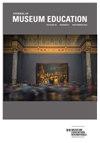Activist Pedagogies in Museum Studies and Practice: A Critical Reflection
IF 0.6
Q3 EDUCATION & EDUCATIONAL RESEARCH
引用次数: 2
Abstract
What constitutes activism? It is a slippery term, containing an inherent subjectivity. In exploring activist pedagogies, as we approach them alongside our fellow authors in this Special Issue, we outline our perspective on activism and its link to museum education and practice. Museums have always been sites of political conflict. However, the recent turn toward activism is a newer aspect of their professional practice. Challenging the myth of neutrality in these spaces, practitioners and staff at all levels, as well as those teaching museums, galleries and heritage studies at the university level, have in recent years, begun to build activist perspectives and practices into their programs in order to advocate for global social justice and change. This Special Issue is designed to capture this shift toward a more activist practice amongst practitioners and academics who engage with museums. Born out of a seminar series, Museums, Galleries and Heritage (Studies) from the Edges, which was organized at Newcastle University (UK) between 2019 and 2020, this Special Issue, like the seminar series, is focused on bringing together voices at the foreground of activist teaching and practice from across the museum sector and higher education. Whilst our own background as editors of this Special Issue is primarily an academic one, our experience of running the seminar series at Newcastle University – in which sessions on class, decolonization, (dis)ability, queerness and race were jointly led by academics and practitioners from the cultural sector in the UK – convinced us of the need to increase the opportunities for dialogue between those academics and practitioners who are in pursuit of activist aims. In many ways, a written journal is not the most natural medium for these dialogues; however, we hope this Special Issue will provide a useful starting point for those looking to insert some of these ideas and conversations into their own practices. The value of academic-practitioner collaborations both to educational and activist work in museums has already been discussed, both within this journal and elsewhere. However, this Special Issue represents the first time that such conversations have been united through the specific consideration of shared activist pedagogies across these sectors. We find it important to think about the range of pedagogies involved when we intertwine discussions between higher education and museum sites. It is helpful to think about the process, as Loutzenheiser describes, of how knowledge is transferred from professors, museum practitioners and possible activists who train incoming博物馆研究与实践中的激进主义教学法:一种批判性反思
什么是行动主义?这是一个狡猾的术语,包含着内在的主观性。在本期特刊中,当我们与其他作者一起探讨行动主义教学法时,我们概述了我们对行动主义及其与博物馆教育和实践的联系的看法。博物馆一直是政治冲突的场所。然而,最近转向行动主义是他们专业实践的一个新方面。近年来,为了挑战这些空间中中立的神话,各个层次的从业者和工作人员,以及那些在大学层面教授博物馆、画廊和遗产研究的人,开始在他们的项目中建立活动家的观点和实践,以倡导全球社会正义和变革。本期特刊旨在捕捉与博物馆合作的从业者和学者向更积极实践的转变。《边缘的博物馆、画廊和遗产(研究)》系列研讨会于2019年至2020年在英国纽卡斯尔大学举办,本期特刊与系列研讨会一样,旨在汇集博物馆部门和高等教育中激进主义教学和实践前景的声音。虽然我们作为本期特刊编辑的背景主要是学术背景,但我们在纽卡斯尔大学举办系列研讨会的经验——其中关于阶级、非殖民化、(残疾)能力、酷儿和种族的会议是由英国文化部门的学者和实践者共同领导的——使我们确信有必要增加那些追求激进目标的学者和实践者之间的对话机会。在许多方面,书面日记并不是这些对话最自然的媒介;然而,我们希望这期特刊将为那些希望将这些想法和对话融入自己实践的人提供一个有用的起点。学术从业者合作对博物馆教育和活动工作的价值已经在本杂志和其他地方进行了讨论。然而,这期特刊首次通过对这些部门共享的激进主义教学法的具体考虑,将这些对话统一起来。我们发现,当我们将高等教育和博物馆场地之间的讨论交织在一起时,思考所涉及的教学方法的范围是很重要的。正如卢岑海泽所描述的那样,思考知识如何从教授、博物馆从业人员和培训新人的潜在活动人士那里转移的过程是有帮助的
本文章由计算机程序翻译,如有差异,请以英文原文为准。
求助全文
约1分钟内获得全文
求助全文
来源期刊

Journal of Museum Education
EDUCATION & EDUCATIONAL RESEARCH-
CiteScore
1.20
自引率
16.70%
发文量
34
期刊介绍:
The Journal of Museum Education (JME) is the premier peer-reviewed publication exploring and reporting on theory, training, and practice in the museum education field. Journal articles—written by museum, education, and research professionals—explore such relevant topics as learning theory, visitor evaluation, teaching strategies for art, science, and history museums, and the responsibilities of museums as public institutions. Published 4 times a year, each issue consists of a guest edited section focused on a specific theme and articles about new research, current trends, tools, frameworks, and case studies, perspectives, and book, exhibit, and program reviews.
 求助内容:
求助内容: 应助结果提醒方式:
应助结果提醒方式:


